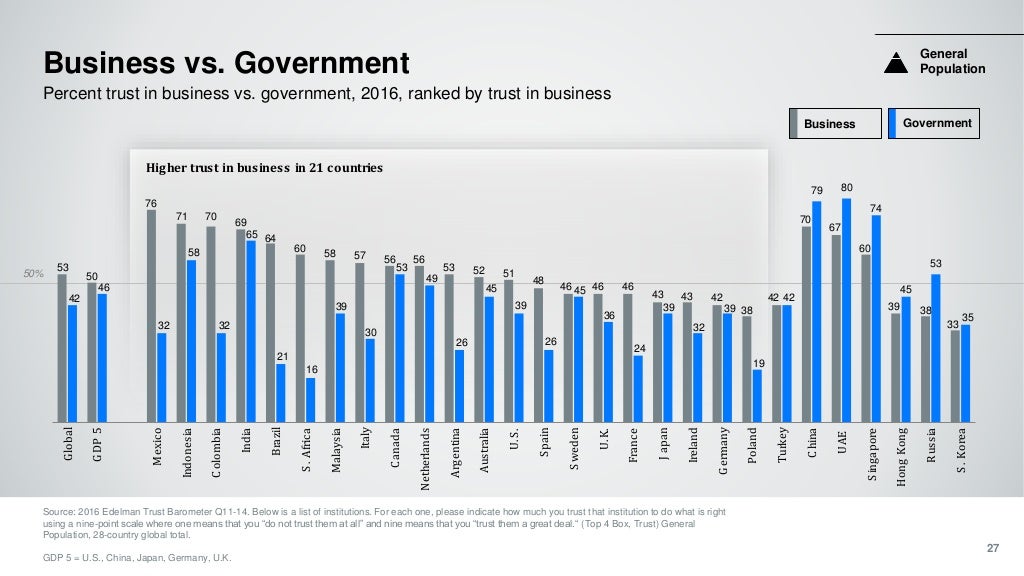Using the high level of trust in business and employee trust in companies.
If
a couple is having a heated argument at home, what would they do if a robber
broke in? It is an analogy I used in response to a detraction from my recent
article on “Seizing the moment”, with the couple
meaning South Africans and the robber a metaphor for the global economy.
Sadly,
it seems that no degree of immediate external threat will distract us from
throwing pots and pans at each other. It is a matter of trust and it appears
that the level of distrust is so alienating that nothing will drive us into
each other’s arms. Frankly, I don’t buy it! I am simply not swayed by the toxic
garbage polluting social media, and the highbrow hype in comment sections on
websites. I rely rather on those expressions of goodwill that I experience
daily. And now we have figures to support it.
But
distrust of government is a real problem. Perhaps Finance Minister Pravin
Gordhan can go some way in this month’s budget in settling the financial
markets and lifting investor sentiment while still appeasing the many open
hands that are regularly outstretched at this time, now multiplied by the
drought. It is a huge task. Unless he does the outrageous and politically
impossible, it is doubtful whether he could even remotely make a difference to trust
in government.
Government
in South Africa has by far the lowest level of trust among the general
population (16%) in the 28 countries and 33 000 respondents surveyed in
the latest Edelman Trust
Barometer.
It is even lower (15%) among the informed respondents.

More
significantly is the much higher level of trust in business (60%), which has
shown a 4% gain over the previous year. It also reflects the second biggest
difference (44%) between trust in business and trust in government. This
difference is much bigger for the informed South African public (75% in
business and 15% in government.) Informed trust in business has jumped 11%. Trust
in South African NGO’s (58%) is nearly 4 times higher than trust in Government.
Even the favourite whipping boy, the
media, enjoy a level of trust nearly 3 times more than that of government.
These
are remarkable findings that no doubt will be scoffed at by government who,
with some justification, can point to paradoxes and the inherent shortcomings of
opinion surveys. One inconsistency is the ruling party’s success at the polls
and its failure to impress in government. Many explanations have been given:
unattractive opposition alternatives, struggle nostalgia, and democratic
(albeit weakening) branch structures of the ANC. By their very nature,
paradoxes become intolerable, and the gap between promises, expectations, and
delivery has its own day of reckoning.
Unlike
snap opinion polls, repetitive opinion surveys tend to become more reliable in
time. Even without using the percentages as absolutes, the huge gap between
trust in government and other institutions cannot simply be disregarded.
It
will be a fundamental mistake to do so. The incessant ideological and populist bashing
of business in South Africa is highly counter-productive. Erosion of trust in
business and other institutions will not lead to enhanced trust in government.
Gossipers may tarnish the reputation of others, but they seldom improve trust
in themselves. All it will do is further erode public trust as a whole, causing
more uncertainty and discontent. The converse is true: displaying more trust in
South African business, ending the ideological belligerence and indeed publicly
embracing business more in seeking solutions, will have substantial mutual
benefits. Of course, business itself has to be more actively involved: especially
when it comes to ethics, social conscience and employee involvement.
The
same goes for organised labour. Its current stance is suicidal and simply a
road to hell. Despite all the boss-bashing that organised labour thrives on, it
has been a poison that it is now having to swallow itself. And all to little
avail. For me, the most significant finding of the Edelman report (see this graphic) is the relatively
high level of trust South African employees (70%) have in the companies they
work for. This is one of the highest in the world, and only slightly lower than
Singapore; outperforming countries like the U.S., Canada, Germany and even
Japan (which now has only a 40% level of employee trust!)
This
finding is so at odds with popular perceptions (including my own) about
seething employee discontent, that one is tempted to assume that the survey is
severely flawed. But it could also mean that the perceptions themselves are
false.
·
Labour
unrest creates media hype, warping perceptions about general employee
satisfaction.
·
Ongoing
labour leader hostility, histrionics and spin, exacerbated by competition for
members and amplified during negotiations.
·
Peer
pressure and collective coercion which overrides individual employee loyalty.
·
Protective
labour laws and procedures causing employees to feel more secure than in many
other countries.
·
The
shift in human resource styles from autocratic to being more consultative.
·
Company
brand loyalty as opposed to trust in company leadership. (Indeed this is borne
out by the research which shows that
CEO’s globally still do not enjoy a high level of trust.)
Even
if the research is only partly true, it represents the most unrecognised and
exciting opportunity for even greater engagement with and involvement of
employees in enhancing the general level of trust in South Africa. The
workplace is a highly significant arena for social interaction and cohesion.
While
I have clearly underestimated the degree of labour involvement that has already
taken place, I would argue that much more can still be done and I have covered
this in much of my writing. It can be taken a
giant leap forward by adopting principles of common purpose and common fate in
the workplace and changing the entire South African economic landscape.
What
else do we have?


No comments:
Post a Comment